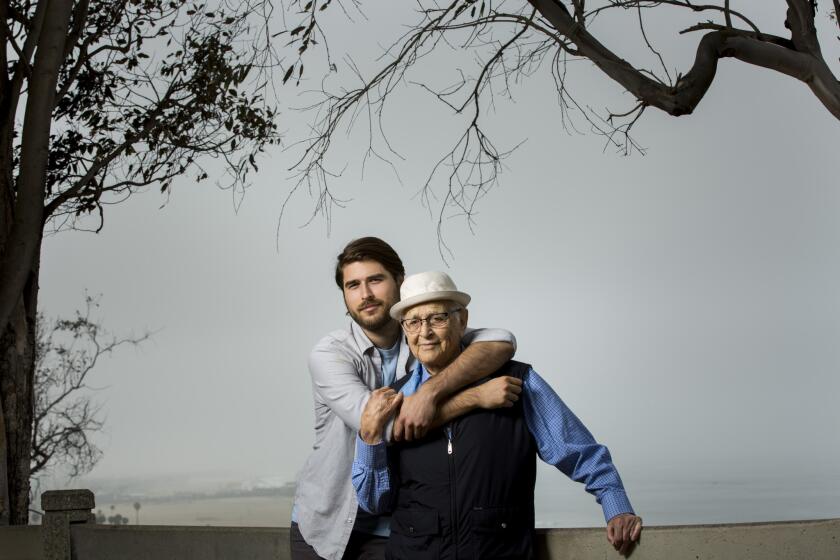Norman Lear receives the Carol Burnett Award at the 2021 Golden Globes
- Share via
Television pioneer Norman Lear, creator of such shows as “All in the Family” and “The Jeffersons,” received the Carol Burnett Award on Sunday, the Golden Globes’ highest award specifically for his medium at the 2021 ceremony.
“It knocks me out to be introduced by Amy Poehler and Tina Fey, and to accept an award, this award in the name of Carol Burnett. I could not feel more blessed,” Lear said by video conference in accepting the award. “I am convinced that laughter adds time to one’s life, and nobody has made me laugh harder, nobody I owe more time to than Carol Burnett and the brilliant team that helped her realize her comedic genius.”
He thanked a long string of his own collaborators, starting with writing partners Ed Simmons and Bud Yorkin, and then family.
Lear’s TV career began in the 1950s, when he and Simmons (the husband of a cousin) wrote comedy sketches for the likes of Dean Martin and Jerry Lewis. In 1959, he created his first series, “The Deputy,” starring Henry Fonda. In 1971, his landmark series, “All in the Family,” based on the British sitcom “Till Death Do Us Part,” debuted.
Shortly before the ceremony, Lear posted a video expressing his gratitude for the honor, mentioning Cecil B. DeMille honoree Jane Fonda and the night’s hosts, Tina Fey and Amy Poehler — and then mentioned the controversy over the HFPA’s lack of Black members (reportedly none in at least 20 years): “As they will talk about tonight, it’s on everybody’s mind, that they’ve been existing all these years without so much as [one] ... I’m eager to hear what they have to say about it and I know that the future will see us working together: Black, brown, white; all of us.”
A Times investigation finds that the nonprofit HFPA regularly issues substantial payments to its members in ways that some experts say could skirt IRS guidelines.
Although “All in the Family” was a sitcom, it confronted some of the day’s social issues, particularly race relations, at a time when such discourse was extremely rare for television. It survived a low-rated first season, largely due to critical acclaim, including several Emmys, and went on to become one of the highest-rated shows of the decade. His hit series, many of which also notably addressed social issues, included “Sanford and Son,” “Maude,” “The Jeffersons” and both the original version of “One Day at a Time” and its 2017 Latinx reboot in a career that is entering its eighth decade for the 98-year-old Lear.
When he was growing up, Ben Lear had a general sense that his dad was a big deal.
The Carol Burnett Award, by contrast, is only 3 years old. Named for its first recipient in 2019, the award is given for “outstanding contributions to television on or off the screen.” Lear certainly qualifies.
In his acceptance, Lear said, “At close to 99, I can tell you I’ve never lived alone. I’ve never laughed alone. And that has as much to do with my being here today as anything else I know.”
In announcing Lear had been named this year’s recipient, the Hollywood Foreign Press Assn. released a statement saying, “Norman Lear is among the most prolific creators of this generation. His career has spanned the Golden Age and the streaming era. His progressive approach addressing controversial topics through humor prompted a cultural shift that allowed social and political issues to be reflected in television. His work revolutionized the industry.”
At the end of his acceptance speech, Lear thanked Burnett again, tugging at his earlobe in a reference to the goodnight gesture she would send her grandmother at the close of each of her shows, saying: “As I think about you and laughter and the joy of our parallel careers ... so glad we had this time together.”
The 2021 Golden Globe Awards winners, which include Chloe Zhao, “Ted Lasso” and Anya Taylor-Joy, were awarded in a bicoastal ceremony.
More to Read
From the Oscars to the Emmys.
Get the Envelope newsletter for exclusive awards season coverage, behind-the-scenes stories from the Envelope podcast and columnist Glenn Whipp’s must-read analysis.
You may occasionally receive promotional content from the Los Angeles Times.










